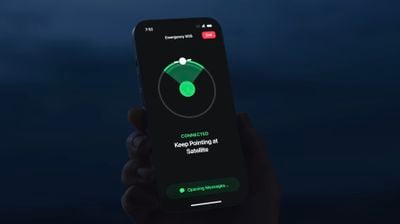 1286
1286
 2022-12-02
2022-12-02
With the launch of iOS 16.1, Apple rolled out a Emergency SOS via Satellite, which is designed to allow iPhone 14 owners to contact emergency services using satellite connectivity when no cellular or WiFi connection is available. The feature was put to the test in Alaska today, when a man became stranded in a rural area.

In the early hours of the morning on December 1, Alaska State Troopers received an alert that a man traveling by snow machine from Noorvik to Kotzebue had become stranded. The man was in a cold, remote location with no connectivity, and he activated the Emergency SOS via satellite feature on his iPhone 14 to alert authorities to his predicament.
Apple's Emergency Response Center worked with local search and rescue teams and the Northwest Arctic Borough Search and Rescue Coordinator to send out volunteer searchers directly to the GPS coordinates that were relayed to Apple using the emergency function.
The man was rescued successfully and there were no injuries. The area where he was located is remote and on the fringes of where satellite connectivity is available. Apple says that satellite connectivity might not work in places above 62° latitude, such as northern parts of Canada and Alaska, and Noorvik and Kotzebue are close to 69° latitude.
Troopers who helped with the rescue were "impressed with the accuracy and completeness of information included in the initial alert," with the Emergency SOS via Satellite feature designed to ask several questions ahead of when an alert is sent out to expedite rescue missions.
Emergency Satellite via SOS is available to all iPhone 14 users, and it can be activated when an emergency situation occurs and there is no WiFi or cellular connection available. The feature is free to use for two years, and Apple has not yet provided detail on how much it will cost going forward.
Satellite connectivity is available in North America at the current time, and it will soon expand to France, Germany, Ireland, and the UK.
Source: Macrumors